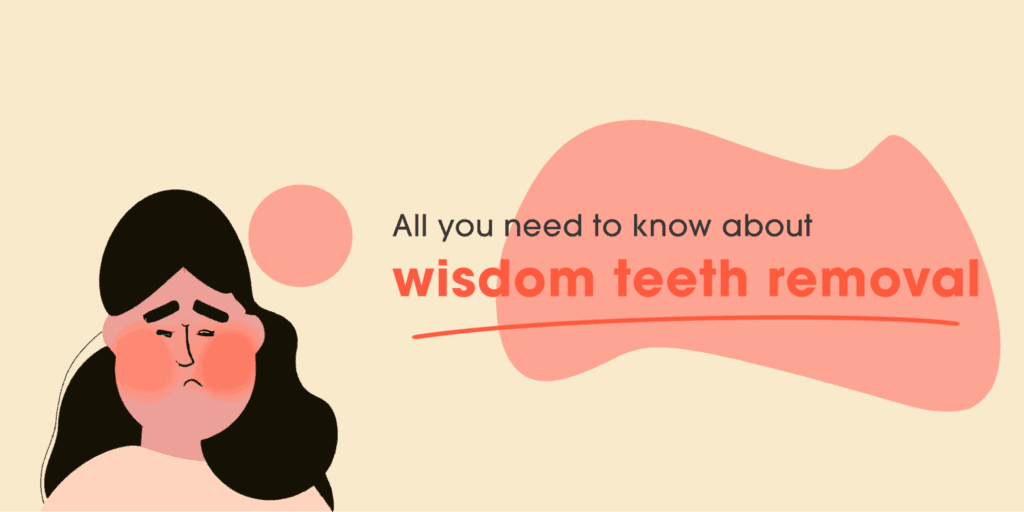Wisdom teeth are also called third molars. They’re also called permanent molars, because they’ll be with you for life—and after they erupt, they’re considered permanent adult teeth that have a full set of enamel (the hard outer layer of your tooth).
Why get your wisdom teeth removed?
If you haven’t had your wisdom teeth removed, you’re probably thinking about it. There are a lot of reasons to get them out:
- They’re a pain in the neck (literally)
- They can grow into your sinuses and cause infections
- They can cause damage to other teeth or gums
- They make your jaw smaller, which is bad for your overall health
But the main reason we all want to get those teeth out? They’re just not worth having. They take up space that could be used for better things like ice cream or cheese puffs. And even if you don’t want to spend some money on getting rid of them (and trust me, we know how hard it is), they’ll still cost you every time they start hurting and need fixing. Who wants to dedicate a budget for something that doesn’t even benefit them?
Just say no! Say no to wisdom teeth!
Procedure
Anesthesia
To remove wisdom teeth, a dentist will administer local anesthesia to numb the area around the tooth.
Aside from being numb around the area, you can choose to be asleep for the procedure. You can literally fall asleep and wake up when its done. This is called sedation.
This can be done in different ways depending on your comfort level and pain tolerance. Some people prefer to have no sedation at all, while others find that it helps them relax as they go through this procedure.
Extraction
Next, the dentist will use a surgical instrument called a dental elevator to separate your gum tissue from your tooth roots (the part of your tooth below the gum). Your gums may bleed during this process but it should stop soon after you are finished with surgery. Once they are separated, they’re removed using forceps or pliers that look similar to regular pliers but have extra-long handles so that you don’t accidentally pinch yourself while operating them! You may feel some discomfort or pressure during this process because there’s still some sensitive nerve endings inside those roots; however once everything has been removed there shouldn’t be any pain involved anymore!
PRP (Platelet Rich Protein)
At LA Dental, we always place PRP. This amazing healing substance is from your own blood cells and minimizes a lot of the post operative problems because it helps your body heal much faster.
Postoperative care
You’re probably wondering how long it takes to recover from wisdom teeth removal.
The answer is: as long as you let it! Most people feel back to normal within one week after their procedure.
If you’re worried about how much time you’ll need to take off work, we’ve got your back. Just stick to these tips and you’ll be back on track in no time.
What to eat and drink after your wisdom teeth removal
First things first: eat a lot of soup. Not just any soup—specifically, chicken noodle or tomato soup. These soups have been proven to reduce the risk of infection following surgery by as much as 50%. Plus, they’re delicious! So get eating!
Second: drink lots of water. This will help flush out any bacteria that may have entered your system during surgery and keep it from spreading throughout your body. Drink at least eight glasses of water each day for optimal results (and don’t forget to pee!)
Pain management
The first 24 hours after surgery will be the most painful. The pain you feel is due to nerve irritation and inflammation of the surgical site.
Take pain medications as prescribed by your doctor—but only if they’re absolutely necessary! There’s nothing worse than being loopy while trying to recover from wisdom teeth removal surgery (except maybe having your teeth removed in the first place). We recommend taking ibuprofen before bedtime.
If you are still in significant discomfort after taking these medications, contact your doctor immediately so that they may prescribe stronger medication if needed.
Cost and insurance coverage
If you’re wondering how much wisdom teeth removal is going to cost you in Los Angeles, we’ve got some good news: it’s probably not as much as you think.
The first thing to consider is whether or not your wisdom teeth removal will be covered by your dental insurance. If so, talk to your dentist about the details of what will and won’t be covered by your plan. In most cases, wisdom teeth removal is considered medically necessary and should be covered in full by your insurance provider.
If your wisdom teeth removal is not covered by your dental insurance, then it’s time to look into other financing options. LA Dental offers great solutions with affordable installments that won’t break the bank: interest-free financing for up to 18 months with no annual fee. So you can pay off your procedure over time without having to worry about paying interest on top of everything else!
